|
|
|
Sort Order |
|
|
|
Items / Page
|
|
|
|
|
|
|
| Srl | Item |
| 1 |
ID:
123582
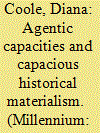

|
|
|
|
|
| Publication |
2013.
|
| Summary/Abstract |
In this article, I note that the idea of a new materialist turn has recently been gathering steam. The first part considers some of the signature elements of the new materialisms. The most distinctive aspect identified here is the invocation of a generative or vital ontology of immanence. Following discussion of some of its principal claims, the article draws out its implications for reconceptualising agency, in particular regarding the way agentic capacities are recognised to be distributed across animate, and perhaps also inanimate, entities. The significance of this development for the political sciences is then explored. In a second part, I suggest that the new materialism entails a normative project. Here, ethical overtures towards a new sensitivity predicated on vital materialist insights are contrasted with a renewed critical theory. The latter is commended as a material reckoning of the 21st century: a project provisionally labelled a capacious historical materialism.
|
|
|
|
|
|
|
|
|
|
|
|
|
|
|
|
| 2 |
ID:
139022
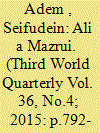

|
|
|
|
|
| Summary/Abstract |
In 2013, Ali A Mazrui gave a lecture in Muscat (Oman) about Barack Obama, the 44th president of the USA, in which he suggested that Obama was a great man but not yet a great president. Mazrui said we would have to wait and see if Obama would become a great president. I think Mazrui was right. But we would not have to wait any longer to say: ‘Ali A Mazrui: a great man, a great scholar’. On 12 October 2014, Ali Mazrui passed away at the age of 81. He was indeed a great man and an extraordinary scholar. This essay is a special tribute to him.
|
|
|
|
|
|
|
|
|
|
|
|
|
|
|
|
| 3 |
ID:
173365
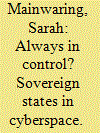

|
|
|
|
|
| Summary/Abstract |
For well over twenty years, we have witnessed an intriguing debate about the nature of cyberspace. Used for everything from communication to commerce, it has transformed the way individuals and societies live. But how has it impacted the sovereignty of states? An initial wave of scholars argued that it had dramatically diminished centralised control by states, helped by a tidal wave of globalisation and freedom. These libertarian claims were considerable. More recently, a new wave of writing has argued that states have begun to recover control in cyberspace, focusing on either the police work of authoritarian regimes or the revelations of Edward Snowden. Both claims were wide of the mark. By contrast, this article argues that we have often misunderstood the materiality of cyberspace and its consequences for control. It not only challenges the libertarian narrative of freedom, it suggests that the anarchic imaginary of the Internet as a ‘Wild West’ was deliberately promoted by states in order to distract from the reality. The Internet, like previous forms of electronic connectivity, consists mostly of a physical infrastructure located in specific geographies and jurisdictions. Rather than circumscribing sovereignty, it has offered centralised authority new ways of conducting statecraft. Indeed, the Internet, high-speed computing, and voice recognition were all the result of security research by a single information hegemon and therefore it has always been in control.
|
|
|
|
|
|
|
|
|
|
|
|
|
|
|
|
| 4 |
ID:
147688
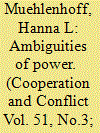

|
|
|
|
|
| Summary/Abstract |
Traditional definitions of power assume a unidirectional and coercive relationship between two actors. The debate about power in International Relations has questioned such a compulsive unidirectionality by pointing to the multidimensionality of power, as well as to the power of those who are traditionally seen at the receiving end. It is especially the latter aspect that has not been taken up seriously by empirical analyses. Moreover, research has ignored the complex power struggles the ‘receiving’ actors are engaged in and their possibility of resistance. If taken into account, these Foucauldian revisions of the concept of power allow us to analyse the development of the relationship between Turkey and the European Union (EU) since the turn of the millennium in a much more nuanced way than is often done in the existing Europeanisation literature. This case is particularly interesting, firstly because of the change in relations between the EU and Turkey, questioning the condition of a credible membership perspective under which the traditional form of power of the EU over its neighbourhood becomes effective. It secondly shows that the EU’s power extends much beyond the imposition of policy changes and has restructuring effects on society as a whole, while domestic actors are by no means passive recipients in this process.
|
|
|
|
|
|
|
|
|
|
|
|
|
|
|
|
| 5 |
ID:
052654
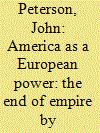

|
|
|
| 6 |
ID:
099374
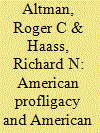

|
|
|
| 7 |
ID:
098557
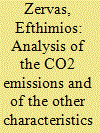

|
|
|
|
|
| Publication |
2010.
|
| Summary/Abstract |
Exhaust CO2 emitted from passenger cars is one of the major greenhouse effect gases. Several parameters influence the exhaust CO2 emissions of each passenger car: its characteristics (fuel used, vehicle weight, …) and its use (annual mileage, driving conditions, …). CO2 emissions from passenger cars decrease during last years; however, this decrease seems to reach its limits. Several parameters of the EU15 new PCs market, such as new passenger cars registrations, type of fuel used, engine capacity, max. power, max. specific power, segment distribution, vehicle weight and their CO2 emissions on the New European Driving Cycle are analyzed here. The target is to find the real market parameters influencing exhaust CO2 emissions. Because of the many data used and the parameters examined, this first part of the work is focused on the average values of each parameter studied and the values of each country, while the second part is based on the analysis of each PC segment and the third one on the analysis of the major brands presented in the European market.
|
|
|
|
|
|
|
|
|
|
|
|
|
|
|
|
| 8 |
ID:
131984
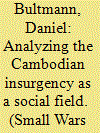

|
|
|
|
|
| Publication |
2014.
|
| Summary/Abstract |
This article investigates power practices in the Cambodian insurgency after 1979 as being part of a social field. There are various types of power practice being exercised by commanders aiming at making soldiers disciplined inside the insurgency. The hypothesis explaining these variations being proposed here is that the type of power being exercised depends on the habitus of the respective commander. Power practices are shaped by the incorporated classificatory discourse of commanders on good soldierhood and leadership. Thereby, armed groups can be analyzed as a social field in which practices are always relational and part of symbolic struggles between different commanders.
|
|
|
|
|
|
|
|
|
|
|
|
|
|
|
|
| 9 |
ID:
126041
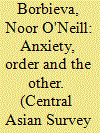

|
|
|
|
|
| Publication |
2013.
|
| Summary/Abstract |
Neither well-being nor suffering can be understood without understanding how the two experiences are related. In this paper, the author focuses on the experiences of well-being and suffering in everyday, mundane contexts, such as food preparation, cleaning and hospitality. Data presented are drawn from fieldwork conducted among ethnic Kyrgyz and Uzbeks in southern Kyrgyzstan, shortly after independence. The author discusses how the experiences of well-being and suffering are informed by symbolic systems that are linked to religious beliefs. This examination contributes to an understanding of the power of religious symbols, arguing that the expectations of well-being or suffering make systems of religious symbols more compelling.
|
|
|
|
|
|
|
|
|
|
|
|
|
|
|
|
| 10 |
ID:
105923
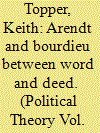

|
|
|
|
|
| Publication |
2011.
|
| Summary/Abstract |
This essay investigates questions about the relationship between language, speech, and democratic institutions by bringing into conversation Hannah Arendt's and Pierre Bourdieu's distinctive views of the politics of language and speech. First, I explicate Arendt's account of the connection between speech, action, and identity disclosure, as well as its role in her broad conception of political institutions. Next, I complicate this outlook by examining Bourdieu's political sociology of language, focusing on the ways that linguistic competences valorized in particular institutional settings operate as mechanisms of silencing, domination, and exclusion. Finally, I bring these approaches together by investigating political events-AIDS activism in the United States during the 1980s and early 1990s-that raise critical issues regarding the politics of language and speech within a specific institutional setting. By reading Arendt and Bourdieu together in the context of these events, one can develop a defensible account of the politics of speech in democratic theory and practice.
|
|
|
|
|
|
|
|
|
|
|
|
|
|
|
|
| 11 |
ID:
162412
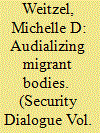

|
|
|
|
|
| Summary/Abstract |
Sound represents a salient yet rarely examined counterpoint to visuality and materiality in security, international bordering, and mobility literature. Using the context of sub-Saharan African migration as grounding for empirical analysis and drawing on fieldwork conducted in Morocco in 2015 and 2016, this article lays the foundation for a research agenda that understands voice, and the sonic body more broadly, as mechanisms of political power. In examining the central roles that sound, hearing, and voice play in strategies of individual resistance at border crossings, as well as in state, private, and transnational communication and surveillance regimes, it attends to the ways in which sound and the audialized body reconfigure power relations, and structure mobility and personal identity. This analysis contributes to the growing literature addressing biometric borders and the deterritorialization of security practices, and argues that sound, along with more familiar nodes of securitization, constitutes a critical site of governmentality and therefore of ethical and moral negotiation.
|
|
|
|
|
|
|
|
|
|
|
|
|
|
|
|
| 12 |
ID:
073683
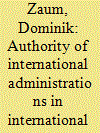

|
|
|
|
|
| Publication |
2006.
|
| Summary/Abstract |
This article analyses the way in which international administrations exercising governmental power in post-conflict territories justify their political authority in the absence of democratic legitimacy. Looking at the administrations in Bosnia, Kosovo, and East Timor, the article focuses on their establishment, their mandates, and their government practices and identifies five different sources of authority: consent, delegation, the maintenance of peace and security, the promotion of human rights and democracy, and the provision of government. However, all of these sources are contested. In particular the practices of international administrations, their lack of accountability and their limited effectiveness in providing government, undermine their authority. The article concludes by highlighting some possible avenues for enhancing the authority of international administrations.
|
|
|
|
|
|
|
|
|
|
|
|
|
|
|
|
| 13 |
ID:
098715


|
|
|
| 14 |
ID:
148157
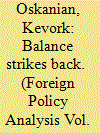

|
|
|
|
|
| Summary/Abstract |
Tbilisi’s recent foreign policy presents analysts working from a balance-of-power perspective with something of a puzzle: with Russia very much the regionally dominant power, against the predictions of structural-systemic theories, small state Georgia has ended up balancing against, rather than bandwagoning with, great power Moscow. As a result, domestic, ideological explanations that implausibly ignore or minimize interstate considerations of power have predominated in analyses of Tbilisi’s foreign policy. In response, this essay examines Georgia’s post-Soviet foreign policies from a neoclassical realist theoretical viewpoint, combining systemic, balance-of-power and domestic ideological factors: throughout the period under review, Tbilisi’s policies were thus due to ideologically conditioned perceptions of shifting power-political realities in its neighborhood, with an ideological adherence to liberal norms playing a particularly important role in distorting these perceptions during the Saakashvili administration. Through this combination of power and ideology, neoclassical realism ends up providing a more comprehensive and continuous account of Tbilisi’s shifting policies since 1992 than either domestic or alternative realist frameworks, like balance-of-threat theory, or omnibalancing; as an important implication, Georgia’s, and other former Soviet states’ continued pro-Western orientation will depend as much on their perceptions of the West’s continued commitment to regional power projection as on domestic ideological preferences.
|
|
|
|
|
|
|
|
|
|
|
|
|
|
|
|
| 15 |
ID:
124052
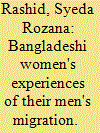

|
|
|
|
|
| Publication |
2013.
|
| Summary/Abstract |
This article examines Bangladeshi women's experiences of their men's migration. It focuses on the lifestyles, household responsibilities, and levels of compliance with or defiance against dominant gender ideologies concerning the everyday lives of left-behind women in two migration-intensive villages in Bangladesh. By locating the meanings and substance of women's power and agency in the context of their living arrangement in nuclear, joint, and natal families, I argue that the choices and priorities of these women be interpreted beyond liberal feminist models of "empowerment" and "emancipation."
|
|
|
|
|
|
|
|
|
|
|
|
|
|
|
|
| 16 |
ID:
085400
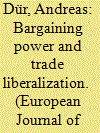

|
|
|
|
|
| Publication |
2008.
|
| Summary/Abstract |
Shortly after the creation of the European Economic Community (EEC, 1958), European countries accepted a far-reaching liberalization of their previously fairly protectionist external trade relations. I provide an explanation of this astonishing development that builds on the argument that the establishment of a customs union increases the bargaining power of its member countries in international trade negotiations. When facing discrimination from a customs union, exporters in excluded countries have an incentive to become politically active and lobby their governments for relief. This increase in exporter lobbying, in turn, weakens the negotiating position of excluded countries in international trade negotiations by making them more eager to achieve a negotiated agreement that lowers the external barriers of the customs union.
|
|
|
|
|
|
|
|
|
|
|
|
|
|
|
|
| 17 |
ID:
182693


|
|
|
|
|
| Summary/Abstract |
Although infrastructures may be material manifestations of state territorial power, the political effects of infrastructures are seldom straightforward. And yet, many accounts of the Belt and Road Initiative (BRI) assume a relatively conventional approach to politics, and to political power. Geopolitical intentionality and top-down policy and strategic planning tend to be emphasised over project-level analyses. In response to what might be viewed as an invented BRI geopolitics, this essay suggests a more technopolitical framing of the Belt and Road and seeks to apply an infrastructural analytic to the question of how political power is realised or frustrated, enhanced or diverted, by the distributed and relational nature of infrastructure projects. It argues that our understanding of the socio-technical complexities of infrastructure is poorly served by viewing them through a conventional geopolitical lens. Instead, it seeks to lay out a research agenda and analytical framework for addressing the questions of how infrastructure projects grow and evolve, how they are embedded within the social-political-cultural contexts in which they develop and how they produce political effects that at times align with broader-scale geopolitical agendas and at other times do not.
|
|
|
|
|
|
|
|
|
|
|
|
|
|
|
|
| 18 |
ID:
132355
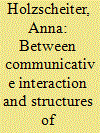

|
|
|
|
|
| Publication |
2014.
|
| Summary/Abstract |
This paper discusses contemporary engagement with the theory and analysis of discourse in international relations. It argues that discourse understood as "meaning in use" has emerged as one of the core concepts in constructivist scholarship, being of tremendous theoretical and analytical value. The paper identifies two distinct types of discourse analysis around which most contributions in this field converge: micro-interactional approaches that emphasize the communicative, pragmatic aspects of discourse and macro-structural approaches focusing on discourse as structures of signification. What unites these studies is their interest in the diffuse power relationships that characterize social interaction in international politics and the productive effects of power that the term "discourse" serves to underline. Through a combination of these two different strands of discourse research, with two different conceptualizations of power (deliberative and productive), the paper develops a taxonomy of discourse approaches that reflects four distinct variants of discourse research. These variants are illustrated by means of an in-depth discussion of recent innovative studies. In conclusion, the paper points to a number of limitations in the present conceptualization of power through discourse as well as in terms of the uneasy combination of positivist epistemology and constructivist ontology in much empirical discourse research. Discussing the overlap between discourse and practice scholarship, the paper sketches future directions for research in this field.
|
|
|
|
|
|
|
|
|
|
|
|
|
|
|
|
| 19 |
ID:
177528
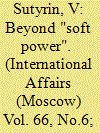

|
|
|
|
|
| Summary/Abstract |
AT THE TURN of the 1990s, when the bipolar world order had fallen apart and the U.S. and the EU had launched their expansionist foreign policy, the West simultaneously formulated the "soft power" concept1 and reissued, so to speak, the philosophical idea of civil society.2 It was a new form of substantiating democracy designed to apply Western patterns in post-socialist societies through nongovernment organizations (NGOs) as agents at the middle and low levels.
|
|
|
|
|
|
|
|
|
|
|
|
|
|
|
|
| 20 |
ID:
188816
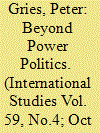

|
|
|
|
|
| Summary/Abstract |
A growing literature demonstrates that ideology shapes international relations. But just how does ideology have its effect? This article develops an integrated model of mediators and moderators of the impact of ideology on foreign policy. Specifically, it hypothesizes that ideologically motivated perceptions of threat and national power sequentially mediate the impact of individual-level ideologies on foreign policy preferences, and that in/out-group social categorization processes moderate the relationship. We interrogate these propositions with three plausibility probe case studies. The conclusion discusses which aspects of the model were best supported by the plausibility probes—and suggests hypotheses for future causal testing.
|
|
|
|
|
|
|
|
|
|
|
|
|
|
|
|
|
|
|
|
|